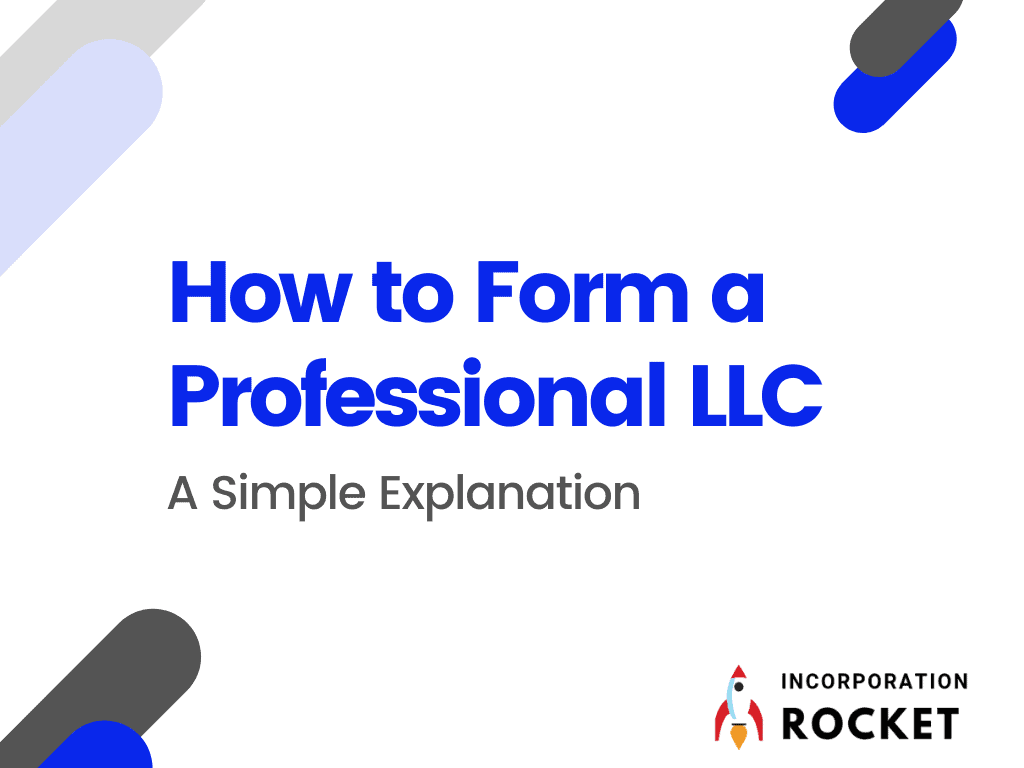Choosing the most appropriate structure for one’s company is difficult, and there are extra factors to consider for any licenced professional (e.g. lawyers, accountants or architects). Limited Liability Companies (LLCs) are one of the most popular types of business entities. This structure is often chosen for its simplicity and the numerous benefits it offers, such as ‘pass-through’ taxation and liability that is limited to the assets of the business alone, not the owners.
This may incline people to choose it over a corporation or sole proprietorship as the formation for their company, however companies offering professional services are, in many states, not legally allowed to form an LLC. They are instead required to form a professional limited liability company (PLLC). So what is the difference?
What Is an LLC?
An LLC is a type of formation businesses often choose because of its flexibility and liability protection. There are several steps in the formation of an LLC:
- Choose a business name – the name must be available (each state will have their own list of incorporated businesses to check yours isn’t matching), not violate your state’s laws (i.e. an LLC name cannot allude it’s connected with the government)
- Complete the Articles of Organisation – these merely state basic information about your company
- Create Operating Agreement – this exists to establish the rights and responsibilities of the company’s members, even if there’s only one (i.e. you, the owner)
- Publish a “notice of intent” – some states require this; it has to be published in an official newspaper
- Obtain licences and permits – certain industries will require these, and therefore a company aiming to enter these industries will require them to form an LLC
- Register the LLC with the state – file all the relevant documents with the state and pay the fee
- Set up a business bank account for the LLC and keep the funds separate
Why Choose an LLC?
People choose LLCs because it is very often financially attractive. They offer the personal liability protection of corporations alongside the pass-through taxation of a sole proprietorship or partnership.
Moreover, limited liability companies protect the personal assets of its owners by keeping them separate from the business’s assets. This means that if the LLC is ever embroiled in legal proceedings, liability will be limited to the business’s assets and thus the personal assets of the owners remain protected.
LLCs also benefit from pass-through taxation. This simply means that less money is deducted from the business’s profits in tax than a corporation because it is only the income of the owners that is taxed (i.e. the share they pay themselves out of a business’s profits), rather than that in addition to the business’s profits.
What Is a PLLC?
For businesses providing certain professional services, an LLC is not an available formation for their business. Instead, they must use a PLLC. The process of formation for a PLLC is almost identical to that of an LLC with only a few slight additions and variations.
Firstly, a company must get its state to approve their PLLC’s articles of organisation (an additional step that LLCs do not have to deal with in the majority of states). The requirements for approval vary between each profession and states, but a general rule of thumb is that proof will need to be provided that every member is a licenced professional in the industry of the company’s choice.
Once approval has been granted by the licencing board of your state, the articles of organisation and any other required documents must be submitted to the Secretary of State’s office. When PLLC status is granted, some states require “PLLC” at the end of your company’s name to properly comply.
A PLLC can be taxed in similar way to an LLC since the IRS does not identify between the two to decide how each is taxed, rather it recognises whether the business chooses to be taxed as a sole proprietorship, partnership, S-Corp or C-Corp. Most of these options will treat PLLCs and LLCs as “pass-through” entities, unless they wish to be taxed as a corporation.
Protection for liability in PLLCs is largely similar to that of LLCs, though there are a few important differences when considering LLC vs PLLC. The first is the PLLC protects members from liability for each other’s malpractice suits (unlike partnerships). Secondly, banks ask for a personal guarantee when lending money to PLLCs, meaning the member who takes out the loan is personally liable for debts they guaranteed, not the business.
